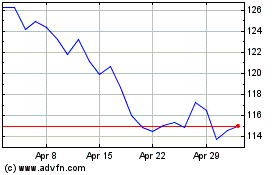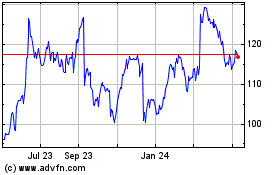By John D. McKinnon and Georgia Wells
WASHINGTON -- The Commerce Department said Thursday it wouldn't
enforce its order that would have effectively forced the
Chinese-owned TikTok video-sharing app to shut down, in the latest
sign of trouble for the Trump administration's efforts to turn it
into a U.S. company.
The department's action delayed implementation of an order, set
to take effect Thursday, that would have barred U.S. companies such
as Apple Inc. from offering TikTok in its app store, and companies
such as Amazon.com Inc. and Alphabet Inc. from offering web-hosting
service for TikTok -- moves that would effectively make it
inoperable in the U.S.
The U.S. crackdown on Chinese social-media apps has been led by
President Trump, and it is unclear how President-elect Joe Biden
will address the situation. Many members of Congress in both
parties, however, have sounded alarms about potential Chinese
data-gathering and surveillance in the U.S.
The outcome has important implications for U.S.-Chinese
relations, as well as the future shape of the global internet, as
other countries wrestle with how to incorporate Chinese technology
companies.
In announcing its decision, the Commerce Department cited a
preliminary injunction against the shutdown last month by U.S.
District Judge Wendy Beetlestone in Philadelphia in a suit brought
by three TikTok stars, comedian Douglas Marland, fashion guru
Cosette Rinab and musician Alex Chambers.
Judge Beetlestone said the government action "presents a threat
to the 'robust exchange of informational materials'" and therefore
likely exceeds the government's authority under the International
Emergency Economic Powers Act, the law the Trump administration has
relied on to take action against TikTok.
The U.S. government appealed that order late Thursday. The U.S.
has argued that it is trying to prevent data on American TikTok
users from being shared with China's authoritarian government,
which TikTok says it would never do. The government also contends
that its efforts are aimed at protecting U.S. users' data, and not
at closing off informational exchanges.
As the battle plays out in court, the Commerce Department
statement on Thursday said the shutdown order wouldn't go into
effect "pending further legal developments."
The concession comes as the administration's clampdown has been
undermined by a series of legal challenges from the social-media
app and its allies. Those challenges initially attacked the
government's authority to order a shutdown in the event that the
company wasn't divested by Thursday.
This week, TikTok and its Chinese parent company, ByteDance
Ltd., also asked a federal appeals court in Washington, D.C., to
overturn an order by the Committee on Foreign Investment in the
U.S. that ByteDance divest the company.
In a statement Thursday, a TikTok spokeswoman said the company
was "focused on continuing to engage CFIUS" in an effort to address
the security concerns, "even as we disagree with them."
The Treasury Department, which oversees Cfius, issued a
statement a day earlier saying that it "remains focused on reaching
a resolution of the national security risks" from TikTok.
As the legal underpinnings of the Trump administration's effort
appear to be weakening, there were signs that the parties also were
still far apart on the terms of the deal. Still, people familiar
with ByteDance's thinking said the company was hopeful about
reaching an agreement that would allow TikTok to remain in the
U.S.
Mr. Trump issued an order in August stating that TikTok would be
banned in the U.S., but later told reporters that he might approve
a divestiture to a U.S. company.
Under a preliminary proposal that Mr. Trump approved in concept
in September, Oracle Corp. and Walmart Inc. would take a combined
20% in TikTok Global, a new U.S.-based company that would run the
global service. But among the major sticking points in the
continuing negotiations was the size of the stake that ByteDance
would get to keep in TikTok, according to people familiar with the
matter.
People familiar with ByteDance have said the company is working
to take measures to safeguard the data of its American users, but
noted that they don't believe the U.S. government has authority to
dictate the corporate structure of a Chinese company.
In its recent filing in the appeals court case, TikTok said that
ByteDance recently submitted a fourth version of its proposal for
addressing U.S. security concerns.
The proposal called for creating "a new entity, wholly owned by
Oracle, Walmart and existing U.S. investors in ByteDance, that
would be responsible for handling TikTok's U.S. user data and
content moderation." That U.S. entity could be created in addition
to a TikTok Global unit, according to people familiar with the
matter.
ByteDance is still working to reach an agreement with the U.S.
government, the people said.
Chinese authorities will also need to sign off on the deal,
which must comply with recent restrictions it placed on exports of
data-processing technologies such as content-recommendation
algorithms -- a move widely seen as aimed at TikTok.
Write to John D. McKinnon at john.mckinnon@wsj.com and Georgia
Wells at Georgia.Wells@wsj.com
(END) Dow Jones Newswires
November 12, 2020 18:20 ET (23:20 GMT)
Copyright (c) 2020 Dow Jones & Company, Inc.
Oracle (NYSE:ORCL)
Historical Stock Chart
From Mar 2024 to Apr 2024

Oracle (NYSE:ORCL)
Historical Stock Chart
From Apr 2023 to Apr 2024
